HCMC – The recovery of the Vietnamese manufacturing sector was disrupted by storms and flooding in November, with output dipping and new order growth slowing to a marginal pace, according to the latest report by IHS Markit.
The Covid-19 pandemic remained a hindrance to operating conditions. Purchasing activity and employment were also scaled back, but business sentiment improved to a 16-month high, the report showed.
The Vietnam Manufacturing Purchasing Managers’ Index (PMI) dipped fractionally below the 50.0 no-change mark to 49.9 in November, signaling broadly unchanged business conditions during the month. This followed a reading of 51.8 in October and was the first sub-50 figure in three months.
Output decreased slightly last month, thereby ending a two-month sequence of growth. However, anecdotal evidence suggested that the reduction could be temporary as a number of firms said the recent stormy weather and subsequent flooding had disrupted their production during the month.
New orders continued to rise, but only fractionally as business was impacted by the stormy weather conditions and flooding as well as the pandemic. The latter had a particular effect on new export orders, which declined sharply. On the other hand, a number of respondents said new orders had increased amid improving underlying demand.
With new order growth slowing, firms worked through outstanding business, leading to a tenth straight reduction in backlogs of work. The latest fall was hard, but softer than that of October.
Falling workloads led to firms scaling back their employment and purchasing activity in November. The modest reduction in staffing levels followed a slight rise in the previous month.
Purchasing activity decreased for the first time in three months. The fall in buying inputs led to a reduction in stocks of purchases. Meanwhile, a reduction in output during the month resulted in a decrease in the stocks of finished goods.
The stormy weather and Covid-19 pandemic also disrupted the delivery of purchased items to manufacturers. Suppliers’ lead times lengthened for the 12th successive month and to the greatest extent since August.
Shortages of raw materials contributed to rises in input costs in November, with difficulties in importing items and higher prices in international markets also cited. Input prices increased sharply and at the fastest pace since August 2018. The rate of output price inflation also quickened, but remained modest.
Despite the setback in November, firms expect production to expand over the coming year. Confidence was centered on expectations that the Covid-19 pandemic would remain under control in Vietnam and cause less disruption globally.
“Although at first glance the latest Vietnam Manufacturing PMI figures are a little disappointing, there is reason to believe the setback in November was just a blip on the road to recovery. A number of panelists signaled that a succession of storms have hit Vietnam in recent weeks, along with associated flooding, hindered production, new orders and the receipt of deliveries during the month,” Andrew Harker, economics director at IHS Markit, said about the latest survey results.
“We could therefore still be on track for a positive end to the year. In fact, business confidence improved to the highest since July 2019 on expectations that the Covid-19 pandemic will prove less disruptive in 2021. IHS Markit forecasts the GDP in Vietnam will rise 6.1% next year,” he added.









